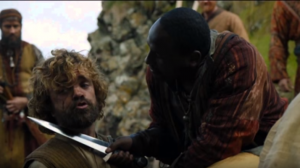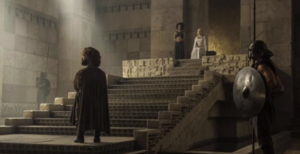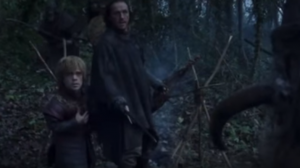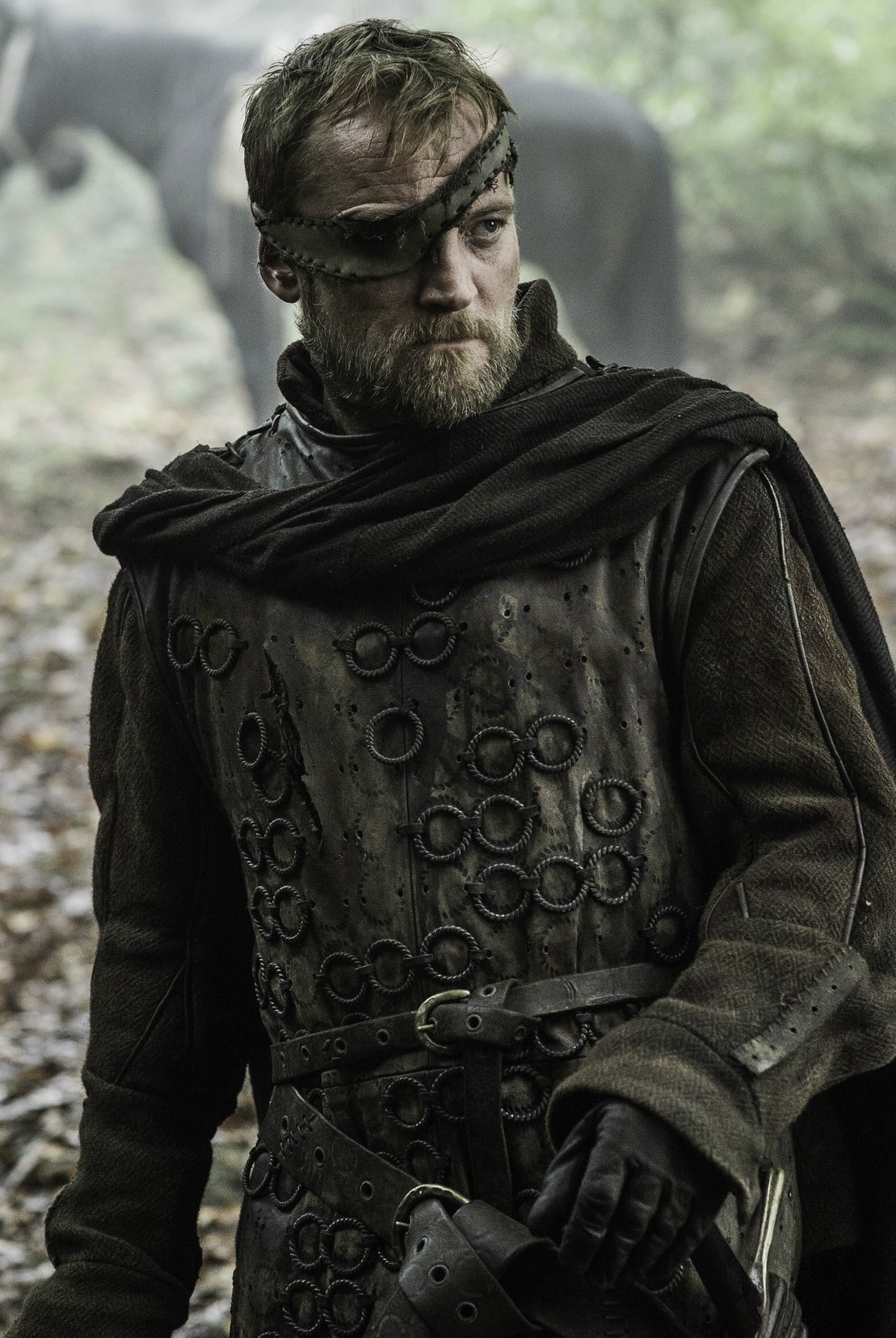Tyrion Lannister is the youngest son of Joanna Lannister and Lord Tywin Lannister. Tywin was the head of House Lannister, the richest man in Westeros and Lord Paramount of the Westerlands. The Westerlands are one of the constituent regions of the Seven Kingdoms and House Lannister of Casterly Rock is one of the Great Houses of the realm. He is the younger brother of Jaime and Cersei Lannister. His mother Joanna Lannister died giving birth to him. His father and sister held him in contempt as they blame him for the death.
He is a dwarf, causing him problems and persecution. His size has led him to be referred to derisively by various names, such as “the Imp” and “The Halfman”. This is mitigated by his intellect and his family’s wealth and power. Had an infant with dwarfism like Tyrion been born a commoner, he’d have simply been left out in the woods to die. However, Tyrion was born into a powerful noble House and was therefore spared. Even though his father didn’t think much of him, he has had the benefits of being raised with wealth and education and was expected to lead his life as a credit to the Lannister name. He was committed to the good of both his House and since Cersei married King Robert Baratheon, his family’s continued hold on the throne.
When Tyrion was 16, he met a wheelwright’s daughter named Tysha on the road, apparently the victim of an attempted rape. While his brother Jaime ran off the attackers, Tyrion helped Tysha recover from the ordeal, and they became lovers. They found a drunken, wandering septon willing to marry them and briefly, they lived as husband and wife. That is until Lord Tywin learned what had happened. Jaime confessed that he organized the incident to make his brother happy, and Tysha was actually a prostitute. As a lesson, Tywin gave Tysha to his guards, paying her a silver coin for each man and forcing Tyrion to watch. By the end, there were so many silver coins that they were running out of her hands onto the ground. Tyrion reciprocated Tywin’s hatred ever since.
His two siblings had positions of respect and responsibility since their teens. When Tyrion turned sixteen (the age of manhood), Tywin Lannister put Tyrion in charge of the drains and cisterns at Casterly Rock. Tyrion brags that the “[sewage] never flowed [smoother] to the sea.”
Tyrion spent a lot of time at court in King’s Landing to avoid his father. He got on well with Jaime and his niece Myrcella and nephew Tommen but had a colder relationship with Cersei and his sadistic nephew Joffrey. He had a fondness for prostitutes and drink, but is also intelligent, cunning, and educated. Tyrion also is a kind man who would protect the innocent, claiming that he loves broken things.
Tyrion Lannister is the man of Westeros all fans know and love. With his very presence, he challenges the concept of a what a hero looks like. His weapon is his wisdom and cunning and ever so delightful wit. He is the paragon of situational awareness as a virtue because only he in the story has had near death encounters and no skill in sword or strength in allies to protect him, only his mind to cut through a path to victory. Despite this, he has shown some errors due to a very emotional disposition and an overactive loud mouth. Tyrion ignores his intuition often which makes his long term plans suffer despite being the best that one could conjure up. This makes him vulnerable to the unexpected turn of events that often escape his already sharp focus. That is a strength we save for later.
Tyrion though is the master of on- the-fly solutions and subtle political maneuvering. His talent, for the lack of a better word, comes from understanding people. He does this by asking the paramount question.
What do they want?
People are defined by their desires, their motives. They home in on the mental image of what they want to be like in life. They devise their entire routines, their thinking to align with their motives. Tyrion understands this and uses it to achieve his own goals. For him, there are three ways to do it-
- Observation- In only a few sentences worth of conversation, Tyrion understood that Bronn the mercenary would follow anyone and do anything if there are wealth and women as a reward. He did this by paying attention to Bronn’s subtle reaction when he mentioned a reward in gold for anyone who would rescue him and also his lewd remark on having female companionship right after a fight. When Bronn casually remarks that he could leave Tyrion without food in a bandit- infested jungle, Tyrion said “What do you want Bronn? Gold? Women? Golden Women? Stick with me and you’ll have it all. For as long as I am around and not a moment longer.”Most of us shout and demand that people do what is fair, what they should do, what we expect them to do. Tyrion does the opposite by understanding the motivation of people and suggesting that they help him to be helped in return.

- Listening- People tell it often all the time. What they want, or how they think the world should be. One can always pay attention. When traveling with Ser Jorah Mormont to Meereen, The two were captured by a group of Slave traders and organ harvesters. As soon as the Slaver leader called Tyrion worthless and commanding his fellow Pirate to harvest Tyrion’s Organ right after cutting his throat due to a local superstition of it having magic powers, Tyrion quickly added that the trader wouldn’t accept it as he wouldn’t know that it was from a dwarf until he sees the Dwarf. Tyrion quickly bought himself a few more moments of a chance to escape with a knife to his throat.There have been enough debaters in the world to inculcate this bad habit in all of us. We often question and attack someone’s frame of mind while we talk to them. Almost intuitively we reject their frames of minds and their viewpoints as if somehow they would infect our thinking. Tyrion uses his words not just to prove a point or win a discussion, but win at life by paying attention to the key points to influence people and events.

- Empathy- Human beings are inherently selfish. We keep looking at any person and situation from our own perspectives. Complaining, chastising our way through life. Tyrion, however, is curious. He looks at other people as individuals who have gone through a series of complex events to form their perspectives and hence their actions. When Jon Snow was being bullied by his fellow Night’s watch recruits in Castle Black armory, Tyrion arrived and casually mentioned to his attackers that he’d remember their faces.While Jon kept complaining about how terrible things are and how the fellow recruits hated him for being a better swordsman, Tyrion invoked his compassion by mentioning Grenn’s father leaving him and Pip’s crime of stealing to avoid starvation, and none of them having someone to teach them swordplay as good as Jon’s. This lesson in understanding other people and listening to their stories is what led Jon to later become a successful and influential Lord commander despite his initial immaturity. An immaturity most of us still possess.
Although the beauty of Tyrion’s machinations doesn’t exist by mere awareness. It also comes from his brilliant methods of putting them in motion.
To understand Tyrion’s communication skill one can keep in mind the four Ws and one H.
- When: Like in life, the more charismatic characters of this story tend to play with silence. Being comfortable while creating an aura of silence is how Interviews begin, how kings and judges communicate authority during trials and hearings, and how the strong silent men appear mysterious and charming. Tyrion, being a dwarf is underestimated and bulwarked through it, but he turns it to his advantage by his well-trained wit.
Saying something remarkably clever or funny, he breaks the image that the world forces on him of being a stupidly silly, angry and funny clown dwarf. He breaks the silence in a way that the listener is compelled to answer or remark at his witticism. Remember, when you control the beginning of a conversation, you control the end of it.
- Who: “I drink and I know things,” ” I’m not even sure you deserve my service.” Why does Tyrion feign such self-centred and arrogant remarks? And why does he do that at times he is at the most disadvantage? Is it not simple?

Showing confidence and the freedom of choice elevates your status even at the worst of circumstances. It makes you appear impressive and alluring, makes people more open to suggestions and dialogue. Most of the time it can be done non-verbally with an imposing posture and by reducing the physical distance between themselves and the listener. Tyrion, at a physical disadvantage, does this by his words. Shifting the focus from the kings, commanders, bandits, and lords to himself, establishing him as the dominant one in the interaction.

- What: In the jungle south of the Vale, Tyrion and Bronn were once ambushed by the hill tribesmen where the bandit leader’s incessant tries to assert his dominance over his new victims were met by Tyrion’s friendly witticism’s as if they were his new friends. This helped him push his agenda to Hire them as his own bodyguards back to his father’s encampment. With a few spirited and painful arguments and offers of a better future, Tyrion succeeded.
Years later, threatened by death or exile by trumped up charges and a false trial, Tyrion used all his anger and frustration to call to the fact that he had been treated unjustly all his life and during this trial, for being a dwarf, and used this to push an new agenda of trial by combat. He succeeded.

A year after that, when threatened at the court of Queen Daenerys he shifted perspective to the life story of the said queen wondering if the real life queen was as worthy of the legend, while subtly suggesting that he could be an advisor to her. By the end of this conversation, you know it, He ended up being her advisor.In all three scenarios, Tyrion shifted the focus. By shifting the bandit’s focus from a mere loot to the promise of more, in the trial from his charges and false proofs to the injustice and prejudice he faced and from the queen’s anger and authority to her chance to gain a friend and an advisor who understood her.
- Where: The where is important. Bigger more comfortable office spaces denote power in the modern world as the bigger better throne rooms denote power in the story. Teachers often sit elevated to the students on a platform, as often kings sat on thrones higher than the rest of the court. People use it to their advantage often. Negotiating on their turf, holding talks in their offices. It is done often when people have tried to assert dominance over Tyrion.

Tyrion would sense that instinctively and choose his physical positioning. Sitting opposite on a long table when facing his father. Moving closer to taller people when they sit down to appear bigger in their minds, stepping closer to the thrones when asserting that they have good suggestions to be considered. - How: Tyrion has used flowery language to persuade the Lords and ladies of Westeros, promising power, favor, honor and similar conceptual possessions. While convincing mercenaries, jailors, and bandits he used guttural language and promises of gold, land, pride and very rarely gratitude and friendship. To tailor his language to the listener has been his uncanny gift.
Everyone needs money but some want to look at an investment opportunity that is safe as well as effective while others just want to talk about getting filthy rich and all the food, clothing and pretty mansions it can buy. How often do we understand the listener before delivering the message in our normal lives while Tyrion did this mostly with his life on the line?
The lessons that can be learned from the Game of Thrones are too short to be encapsulated even in this mammoth of an article, but a bulk of those are encapsulated within this dwarf of a man that stands taller than most men do in real life or in fiction. Understanding the intrigues of human psychology can bring untold benefits in life. And most of it comes down to the fact that you cannot make someone do what you want unless they want to do it too. So ask yourself, do you know what they want?













Leave a Reply